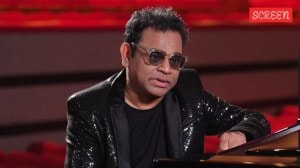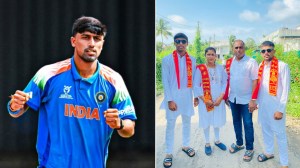Swearing by the Constitution
We need not feel uneasy to put up with the Constitution as it exists. All new thoughts and solutions to new problems experienced, not envi...

8220;We need not feel uneasy to put up with the Constitution as it exists. All new thoughts and solutions to new problems experienced, not envisaged by the Founding Fathers, must translate themselves through the words of the Constitution8230;8221;
Justice M.M. Punchhi in Advocates-on-Record Association vs Union of India, 1993.
An orthodox adherent of the Constitution, Justice Madan Mohan Punchhi, 64, the Chief Justice designate, represents a section of traditional jurists which has viewed with distinct unease the aggressive-reformative sheen that the apex court has acquired in its recent metamorphosis.
A perception and attitude that are perhaps most clearly evident in the dissenting opinion that he gave in what is likely to be remembered as his most famous judgment 8212; the Advocates-on-Record case of 1993.
8220;The judiciary needs to be saved from men of a predominant executive temperament, men who relish and thrive on confrontation, men who would compromise principles to gain their point, men who are not historians of the past and prophets of the future, but who believe in short-term existence,8221; he had said on the disposition of the bench. Clearly, as the paterfamilias of the judicial family, equilibrium and not confrontation would be Justice Punchhi8217;s touchstone.
In his 10 months at the helm of the country8217;s premier judicial institution, there may not be a drastic change in the complexion of the judiciary. But the possibility of the tide of judicial activism, ushered in by Justice Venkatachalaiah, Justice Kuldip Singh and most recently Justice J.S. Verma, ebbing is not entirely improbable.
Born on October 10, 1933, in Pakistan, Justice Punchhi comes from a family of lawyers which migrated to Punjab after Partition and is the third judge from the Chandigarh High Court to head the apex court. His father, Nand Lal Punchhi, was a leading Ferozepur lawyer. After a brief stint as an apprentice in his father8217;s chambers, Justice Punchhi moved to the Chandigarh High Court where he became the public prosecutor in 1974. Subsequently, he was appointed a judge of the same court in 1979 and was elevated to the Supreme Court in 1989.
Justice Punchhi has always maintained that 8220;there is nothing to feel shy in stating that the traditional role of the court in remaining apolitical is a thought of the past8221;. He stated this in the Advocates-on-record case. One of his daughters is married to the son of a senior Delhi BJP leader and a minister, Balramji Dass Tandon. Interestingly, his sons and daughters consider him a 8220;friend, philosopher and guide8221;, seeking his advice on almost all matters. 8220;Yes, on all matters, except professional,8221; clarifies son-in-law Pawan Mutneja, an advocate by profession.
Mild-mannered and affable, Justice Punchhi could not have presented a more stark contrast to his predecessor in appearance, bearing and action. He gives the impression of being a rather myopic, absent-minded professor. Consciously wearing a low-profile, Justice Punchhi may not be known for his interpretive creativity but in the annals of the judiciary, he will be remembered for living up to the age-old adage: in a conflict between equity and law, equity should prevail.
Be it a criminal matter, a matrimonial dispute or a dispute over property, Justice Punchhi has always sought to arrive at a compromise in keeping with his precept that the demand of equity must be interspersed with the law. While his friends, both at the Bar and the Bench, have appreciated his judicial dispensation, his instinct to arrive at an equitable compromise has often exercised his critics.
Chronically industrious, Justice Punchhi is admired in the legal fraternity for his meticulous and thorough approach to a case. Recalls senior Supreme Court advocate Dr Rajeev Dhawan: 8220;I had once asked him to refer to a particular page in the brief during the proceedings, and he said I have the pleasure of listening to the lawyer in the court and of reading the brief at home and I don8217;t mix the two pleasures8217;.8221;
Ironically, a judge who is immensely popular with the Bar for his amiability and courtesy was catapulted into a most unsightly controversy by the Bar itself. Raising a question mark over his integrity, the controversy had threatened to jeopardise his prospects of heading the apex court. His appointment has finally, as even his detractors agree, stopped the judiciary from being discussed on the streets, as one observer put it.
Though not given to judicial innovation, Justice Punchhi is a man of conviction and reasonable ingenuity within the realms of the Constitution. Recalls former additional solicitor-general K.T.S Tulsi, who has known Justice Punchhi from his Chandigarh days: 8220;As a judge of the Chandigarh High Court, he was one of the few judges who had denied bail to several terrorists when militancy in the State was at its peak. He did not cower to the threats that he faced and stuck to the constitutional provisions.8221;One also got a glimpse of his ability to remain unswayed by popular reaction and devise modes of handling a case within the framework of law, when he directed that a special venue be made available for the trial of former prime minister Narasimha Rao in the JMM bribery case in view of security considerations.
A 10-month tenure may be short but it is still a significant spell. It will be a period in which Justice Punchhi will be subject to intense public scrutiny. He will also have to make crucial judicial appointments and address several important questions, as for instance the status of public interest litigation in the country and whether the Constitution bench on the minorities issue is to be revived. His long years of experience he became a lawyer at the age of 22 8212; and his close familiarity with the Constitution should help him tide over the difficult moments.
- 01
- 02
- 03
- 04
- 05































